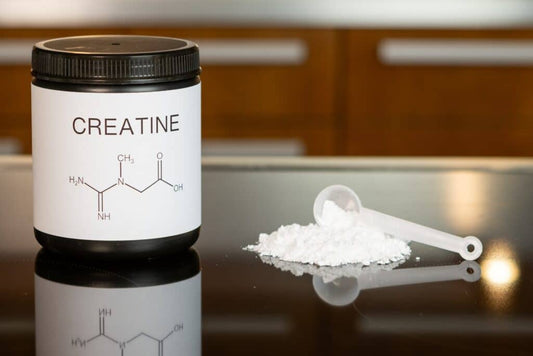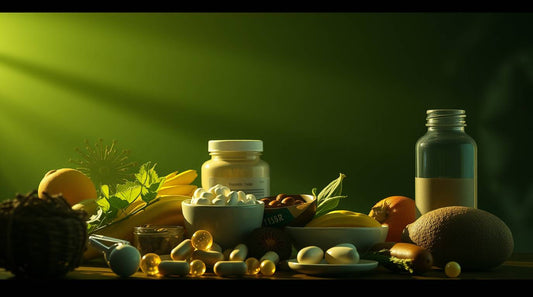A Comprehensive Guide to Immunotropics: Boosting Your Immune System Naturally

Introduction
Our immune system plays a vital role in defending our bodies against infections, diseases, and other threats. While maintaining a healthy lifestyle is key to a robust immune system, certain substances called immunotropics can enhance and support its functions. In this comprehensive guide, we will explore various immunotropics that have been studied for their ability to boost immunity.
What Are Immunotropics?
Immunotropics are compounds or substances that modulate the immune system, making it more efficient at identifying and defending against harmful pathogens. These substances can stimulate or regulate various immune responses, ultimately leading to improved immunity.
- Vitamin C
One of the most well-known immunotropics is vitamin C, also known as ascorbic acid. Numerous studies have shown that vitamin C plays a crucial role in supporting the immune system. It is found in various fruits and vegetables, such as oranges, strawberries, broccoli, and bell peppers.
How Vitamin C Boosts Immunity:
- Enhanced White Blood Cell Function: White blood cells, particularly neutrophils and phagocytes, play a crucial role in fighting infections. Vitamin C helps these cells function more effectively 1.
- Increased Antibody Production: Vitamin C is known to support the production of antibodies, which are proteins that specifically target and neutralize pathogens 2.
- Reduced Inflammation: Vitamin C possesses anti-inflammatory properties, which can help control excessive inflammation, a key component of the immune response 3.
- Vitamin D
Vitamin D, often referred to as the "sunshine vitamin," is another important immunotropic. Our bodies can produce vitamin D when exposed to sunlight, and it can also be obtained from dietary sources like fatty fish and fortified dairy products.
How Vitamin D Boosts Immunity:
- Regulates Immune Response: Vitamin D helps regulate the immune system's response to infections, preventing it from becoming overactive or causing excessive inflammation 4.
- Enhances Antimicrobial Peptides: It promotes the production of antimicrobial peptides, which are natural substances that help the body fight off bacteria, viruses, and other pathogens 5.
- Supports Immune Cell Function: Vitamin D aids in the proper functioning of immune cells, including T-cells and macrophages, which play crucial roles in the immune response 6.
- Zinc
Zinc is a trace mineral found in various foods like meat, poultry, beans, and nuts. It is an essential nutrient for the immune system and has been extensively studied for its immunotropic properties.
How Zinc Boosts Immunity:
- Antiviral Effects: Zinc has been shown to inhibit the replication of certain viruses, making it effective in reducing the severity and duration of viral infections 7.
- Boosts Antibody Production: It supports the production of antibodies, which are essential for recognizing and neutralizing pathogens 8.
- Enhances Wound Healing: Zinc plays a role in wound healing, a crucial aspect of the immune response 9.
- Probiotics
Probiotics are beneficial bacteria that reside in the gut and are also available as supplements. They are known for their role in maintaining a healthy gut microbiome, which is closely linked to overall immune health.
How Probiotics Boost Immunity:
- Balancing Gut Microbiome: Probiotics help maintain a balanced gut microbiome, which is essential for proper immune function 10.
- Supporting Mucosal Immunity: These beneficial bacteria strengthen the mucosal immune system, which lines the respiratory and digestive tracts, providing a barrier against pathogens 11.
- Reducing Inflammation: Probiotics can reduce inflammation in the gut, which can indirectly benefit the immune system 12.
- Echinacea
Echinacea is a herbal supplement derived from the purple coneflower. It has a long history of use in traditional medicine for immune support and has gained popularity in recent years.
How Echinacea Boosts Immunity:
- Reducing Cold Severity: Several studies suggest that echinacea may reduce the severity and duration of colds by enhancing immune function 13.
- Stimulating Immune Cells: Echinacea appears to stimulate the activity of immune cells, such as macrophages and natural killer cells, which are involved in immune defense 14.
Enhancing Immune Memory: It may help the immune system "remember" past infections, leading to improved immunity over time 15.
6. Garlic
Garlic is not only a popular culinary ingredient but also known for its potential immunotropic effects. Allicin, a compound found in garlic, is believed to be responsible for its health benefits.
How Garlic Boosts Immunity:
- Antimicrobial Properties: Garlic exhibits antimicrobial properties that can help combat various infections, including bacterial and fungal 1.
- Immune Cell Activation: Studies suggest that garlic can stimulate the activity of immune cells, such as macrophages and natural killer cells, enhancing the body's defense against pathogens 2.
- Anti-Inflammatory Effects: Garlic may have anti-inflammatory properties that contribute to immune system balance 3.
7. Elderberry
Elderberry is a fruit that has gained attention for its potential immune-boosting properties, particularly in the context of viral infections like the flu.
How Elderberry Boosts Immunity:
- Antioxidant Activity: Elderberries are rich in antioxidants, which can help protect immune cells from damage caused by free radicals 4.
- Viral Inhibition: Some studies suggest that elderberry extracts can inhibit the replication of certain viruses, reducing the severity and duration of viral infections 5.
- Immune Cell Activation: Elderberry may stimulate immune cell activity, enhancing the body's response to infections 6.
8. Astragalus
Astragalus is a traditional Chinese herb known for its potential immunotropic effects. It has been used for centuries to support immune health.
How Astragalus Boosts Immunity:
- Enhanced Immune Cell Function: Astragalus may increase the activity of immune cells like T-cells and macrophages, which are crucial for immune defense 7.
- Anti-Inflammatory Properties: It possesses anti-inflammatory properties that can help regulate the immune response 8.
- Adaptogenic Effects: Astragalus is considered an adaptogen, which means it may help the body adapt to stressors and maintain overall health, including immune function 9.
9. Turmeric
Turmeric is a spice commonly used in cooking and traditional medicine. Its active compound, curcumin, has been studied for its potential immune-boosting properties.
How Turmeric Boosts Immunity:
- Anti-Inflammatory and Antioxidant Effects: Curcumin in turmeric has potent anti-inflammatory and antioxidant properties, which can help support immune function by reducing oxidative stress and inflammation 10.
- Immune Cell Activation: Some research suggests that curcumin can stimulate the activity of immune cells, including natural killer cells and T-cells 11.
- Modulation of Immune Response: Turmeric may help balance the immune response, preventing it from becoming overactive or causing excessive inflammation 12.
10. Vitamin B1 (Thiamine)
Vitamin B1, also known as thiamine, is a water-soluble vitamin that plays a crucial role in various bodily functions, including the immune system.
How Vitamin B1 Boosts Immunity:
- Immune Cell Support: Thiamine is involved in the production of immune cells and can enhance the body's ability to respond to infections 1.
- Antioxidant Activity: Thiamine possesses antioxidant properties that protect immune cells from oxidative stress 2.
- Regulation of Inflammation: Thiamine may help modulate the inflammatory response, contributing to immune system balance 3.
11. Vitamin B6 (Pyridoxine)
Vitamin B6, also known as pyridoxine, is essential for various biochemical reactions in the body, including those related to immune function.
How Vitamin B6 Boosts Immunity:
- Immune Cell Activation: Vitamin B6 plays a role in the activation of immune cells, such as lymphocytes, which are crucial for immune responses 4.
- Antibody Production: It supports the production of antibodies, enhancing the body's ability to recognize and neutralize pathogens 5.
- Immune Regulation: Vitamin B6 helps regulate immune responses, preventing excessive inflammation 6.
12. Vitamin B12 (Cobalamin)
Vitamin B12, also known as cobalamin, is important for the production of red blood cells and the normal functioning of the nervous system, but it also has implications for the immune system.
How Vitamin B12 Boosts Immunity:
- Immune Cell Proliferation: Vitamin B12 can stimulate the proliferation of certain immune cells, contributing to a stronger immune response 7.
- Enhanced Antibody Production: It supports the production of antibodies, which are essential for recognizing and neutralizing pathogens 8.
- Reduced Immune Suppression: Vitamin B12 may help reduce the immunosuppressive effects of stress, promoting better immune function 9.
13. Folate (Vitamin B9)
Folate, also known as vitamin B9, is crucial for DNA synthesis and repair, and it plays a role in supporting the immune system.
How Folate Boosts Immunity:
- Immune Cell Production: Folate is necessary for the production of immune cells, particularly white blood cells, which are central to immune defense 10.
- Antibody Formation: It contributes to the formation of antibodies, which are vital for immune recognition and protection 11.
- Immune Modulation: Folate can help modulate the immune response, promoting a balanced reaction to infections 12.
14. Acetyl-L-Carnitine
Acetyl-L-carnitine is an amino acid derivative with potential immunotropic properties, although more research is needed to fully understand its effects on the immune system.
How Acetyl-L-Carnitine May Boost Immunity:
- Immune Cell Activity: Some studies suggest that acetyl-L-carnitine may enhance the activity of certain immune cells, but further research is needed to confirm its specific mechanisms 13.
- Antioxidant Effects: It has antioxidant properties, which can protect immune cells from oxidative damage 14.
- Potential Immune Support: While preliminary research is promising, more studies are required to establish its role as an immunotropic substance.
15. Oleuropein
Oleuropein is a natural compound found in olive leaves and olive oil, known for its potential health benefits, including immune support.
How Oleuropein May Boost Immunity:
- Antioxidant and Anti-Inflammatory Properties: Oleuropein exhibits antioxidant and anti-inflammatory effects that can positively influence immune function by reducing oxidative stress and inflammation 15.
- Antiviral Activity: Some studies suggest that oleuropein may have antiviral properties, which could contribute to its immune-boosting effects 16.
- Immune System Balance: Oleuropein may help balance the immune response, preventing it from becoming overactive 17.
Conclusion
In conclusion, immunotropics are substances that can positively influence the immune system's functions, making it more efficient in defending against infections and diseases. While the substances discussed in this guide have shown promising results in scientific studies, it's essential to remember that a balanced and healthy lifestyle, including a nutritious diet, regular exercise, and good hygiene practices, remains the foundation of strong immunity along with Olivium.
Here is a list of references for further reading:
These references provide more in-depth information on each topic and can help you explore the science behind immunotropics further. Remember to consult with a healthcare professional before starting any new supplement regimen, especially if you have underlying health conditions or are taking medications.
Footnotes
- Vitamin C and Immune Function ↩
- Vitamin C and Antibody Production ↩
- Anti-inflammatory Effects of Vitamin C ↩
- Vitamin D and Immune Regulation ↩
- Antimicrobial Peptides and Vitamin D ↩
- Vitamin D and Immune Cells ↩
- Antiviral Effects of Zinc ↩
- Zinc and Antibody Production ↩
- Zinc and Wound Healing ↩
- Probiotics and Gut Microbiome ↩
- Probiotics and Mucosal Immunity ↩
- Probiotics and Gut Inflammation ↩
- Echinacea for the Common Cold ↩
- Echinacea and Immune Cell Stimulation ↩
- Echinacea and Immune Memory ↩
- Thiamine and Immune Cell Support ↩
- Antioxidant Effects of Thiamine ↩
- Thiamine and Immune Regulation ↩
- Vitamin B6 and Immune Cell Activation ↩
- Vitamin B6 and Antibody Production ↩
- Immune Regulation by Vitamin B6 ↩
- Vitamin B12 and Immune Cell Proliferation ↩
- Vitamin B12 and Antibody Production ↩
- Vitamin B12 and Immune Suppression ↩
- Folate and Immune Cell Production ↩
- Folate and Antibody Formation ↩
- Folate and Immune Modulation ↩
- Acetyl-L-Carnitine and Immune Cell Activity ↩
- Antioxidant Effects of Acetyl-L-Carnitine ↩
- Oleuropein and Antioxidant Effects ↩
- Oleuropein and Antiviral Activity ↩
- Immunomodulatory Effects of Oleuropein ↩



